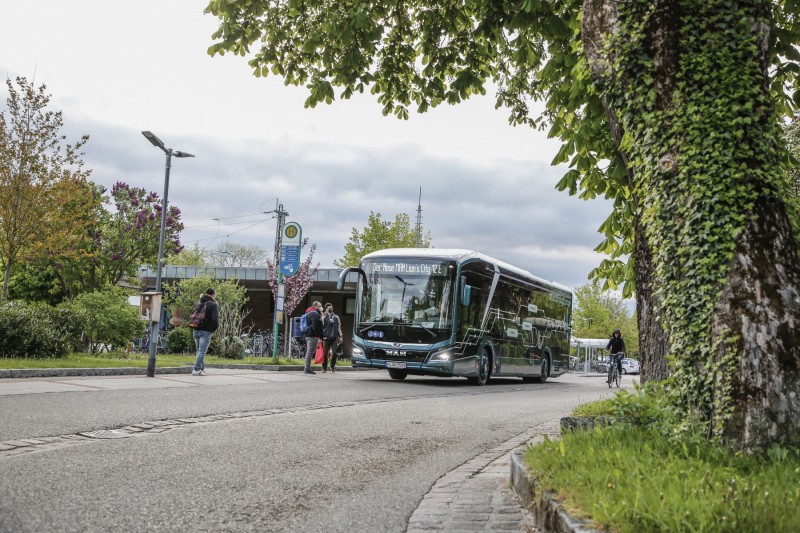At MAN Truck & Bus, business with electric buses is picking up significantly. More than 700 electric buses have already been ordered since the Lion’s City E went on sale. The latest order for a total of 53 of the all-electric city buses has now come from Hamburg. But several of the eBuses are already in use — throughout Europe.
Since the sales launch of the Lion’s City E in 2020, MAN has signed contracts with customers for the delivery of more than 700 electric buses. In the past fiscal year, the Lion’s City E sold by MAN in Europe accounted for around 5.5 percent of all over 2,400 city buses. In Germany, this puts the company in third place in terms of eBuses registered in 2021.
“However, our goal is quite clear: to put even significantly more electric buses on the road: By 2025, half of our new city buses will be alternatively powered. And we expect that just five years later — in 2030 — 90 percent of our city buses will be battery-powered.”
- Rudi Kuchta, Head of Bus Business Unit
Very recently, the Group received two orders for a total of 53 eBuses from Hamburg. Hamburger Hochbahn AG, for example, ordered the electric buses for the first time, with a total of 17 Lion’s City 18 E vehicles. The first vehicles will be delivered this year. The second order from Hamburg comes from Verkehrsbetriebe Hamburg-Holstein GmbH, which has thus opted for these eBuses for the third time. The current order comprises 30 eSolobuses and 6 eArticulated buses. Delivery of the first buses is scheduled for this year.
However, many more ordered eBuses will also be delivered soon. Some of them are already in use — such as the 39 eBuses of VAG Verkehrs-Aktiengesellschaft Nürnberg. The company initially ordered 15 and then, as part of a follow-up order, a further 13 Lion’s City 18 E and 11 Lion’s City 12 E. A total of 15 eBuses will also be on the road in Zurich, Switzerland, on standard urban bus routes from fall 2022. Verkehrsbetriebe Zürich (VBZ) is pursuing a consistent electric bus strategy and has opted for the Lion’s City 12 E as part of this strategy.
The eBuses have also been in operation in Copenhagen since February: the 25 Lion’s City 12 E buses are used on Copenhagen’s central bus line 7A, which carries more than 4.3 million passengers each year. To make urban transportation as sustainable as possible, the city buses are charged exclusively with green electricity. Twelve more eBuses were also recently delivered to Vikingbus in Odder. This means that 37 electric buses are now making their rounds on Danish roads.
In neighboring Sweden, the MAN Lion’s City E also ensures sustainable mobility. KEOLIS has ordered a total of 75 Lion’s City 18 E for Sweden: 60 electric articulated buses are going to Gothenburg and 15 to Stockholm. In addition, another 12 Lion’s City 18 E will soon be running in Uppsala, Sweden. The framework agreement with Gamla Uppsala Buss includes an option for a further 65 electric buses — 45 of them Lion’s City 18 E and 20 Lion’s City 12 E solo buses. In addition, 22 Lion’s City E buses in the coastal city of Malmö in the southern Swedish region of Skåne demonstrate how excellently they can cope with urban traffic and how easily they can be integrated into existing operations. They are operated by Nobina Sverige AB. “There is enormous international interest in forward-looking drive technology,” says Kuchta.
Sophisticated technology, long range
MAN has completed its new generation of city buses with the all-electric Lion’s City E, a zero-emission variant. Series production of the 12-meter solo version started in October 2020 at the Polish plant in Starachowice. The all-electric Lion’s City 18 E articulated bus went into series production in April 2021. This offers space for up to 130 passengers, the solo bus for up to 88 passengers. For the drive system, the Group relies on a central motor on the rear axle in its eBus or two central motors on the second and third axles in the articulated bus, which benefits driving performance. The energy for the all-electric powertrain comes from the batteries on the vehicle roof. The electric buses offer a range of up to 350 kilometers under favorable conditions over the entire service life of the batteries.

















